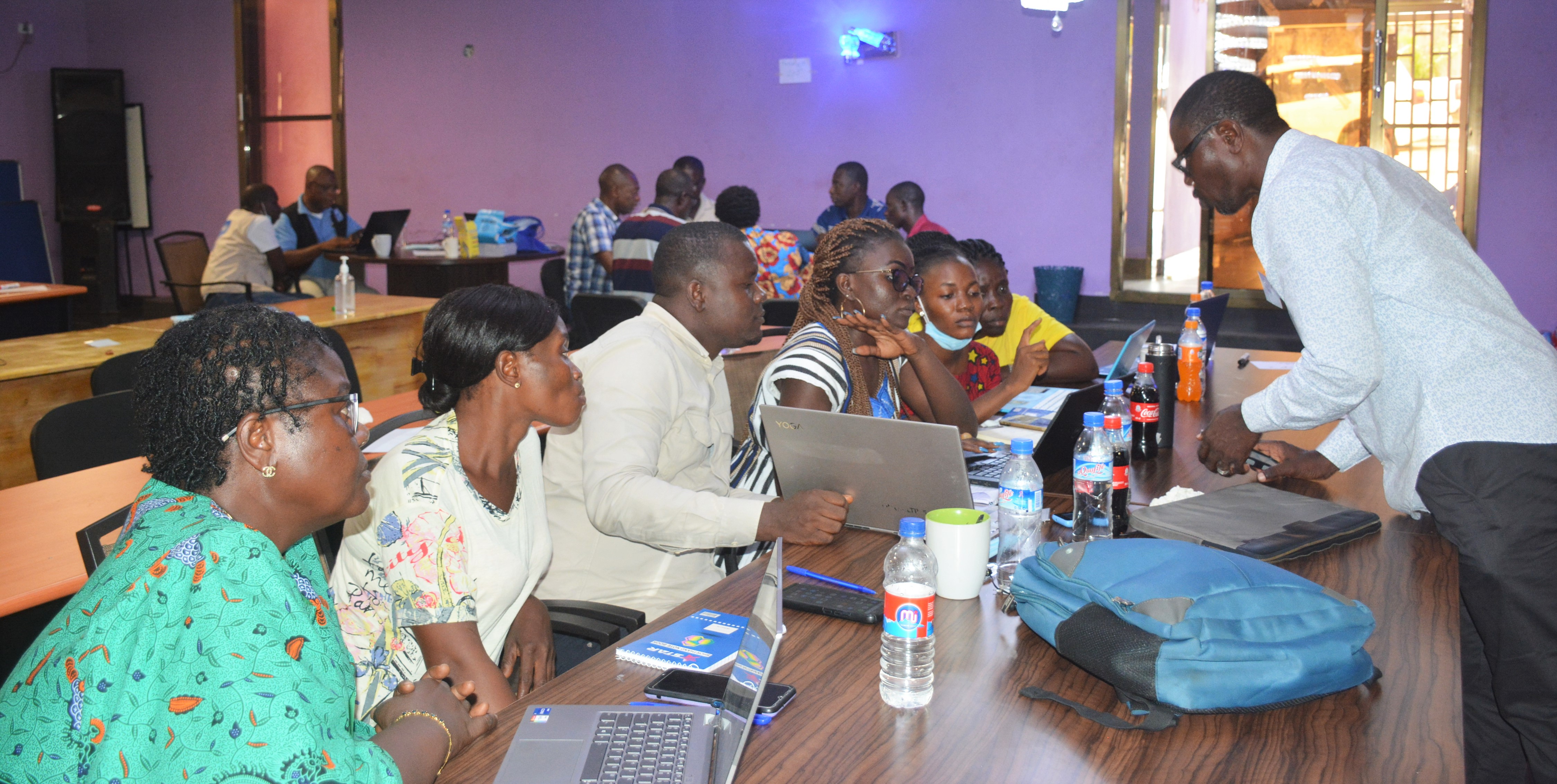LISGIS, MFDP and UNDP Surge Data hub train field enumerators on the use of digital tools
June 27, 2022

One of the groups in session
The Liberia Institute of Statistics and Geo Information Services (LISGIS) and the Ministry of Finance and Development Planning (MFDP) with support from UNDP Surge Data Hub and UNDP Liberia, have trained over ninety field enumerators and their supervisors on the use of digital data analysis, visualization and reporting tools.
The one-week intensive hands-on Training of Trainers held in Buchanan Grand Bassa County 20-25 June 2022, was a follow-up to the conduct of the Social-Economic Impact Assessment (SEIA) digital study.
The training exposed the enumerators who participated in the conduct of the national study on the impacts of COVID-19 on the informal sector, and other staff from LISGIS, MFDP, Central Bank of Liberia, University of Liberia, the NGO sector, Ministry of Labor and UNDP Liberia to the Power Business Intelligence (Power BI) digital tool, to further enhance their analytical capacity, knowledge and skills.
“With the huge data gap being experienced in the informal sector of the Country, the training is an entry point for the government to close some of these gaps and make informed decisions that affect the lives of its people,” said Boima Sonnie of LISGIS.
The Power BI digital tool training will help the enumerators and other participants visualize, clean, analyze, prepare and present data they collect in a rich and compelling way to meet organizational requirements and influence policy change.
“Data is life. Credible and accurate data is important for planning processes and imperative for effecting policies and reforms,” emphasized Fohn Toe Gborweah, Senior Economist at MFDP.
During the training, the participants recommended follow-up training exercises for them to master the digital tools and improve their skills.
Enumerators used the workshop to share their experiences and challenges in the field which range from technicalities, hostile and friendly communities to language barriers, access to communities, lodging, internet access and technology among others. But despite these challenges, the enumerators said they were able to perform their tasks.
“It took me six hours to get to Voinjama from Gbarnga on motorbike, two hours to Kolahun another two hours to Koinubunu,” explained enumerator Larma Weeks. He named language barrier as another major challenge he faced. “In one of the districts, respondents spoke only Kissi while in others Gbandi and Mandingo. I had to seek the help of interpreters to successfully conduct the survey. This training has given me the opportunity to visualize and appreciate the work I did in the field,” Weeks narrated.
Economic Advisor at UNDP Liberia Country Office Ligane Sene said the training was in response to the capacity needed to support the analysis of the digital SEIA collected on the informal sector and to help actors fully understand how the reports and dashboard are developed.
“A report on the informal sector will support the acceleration of the Sustainable Development Goals (SDGs), help develop a macro framework for Liberia and afford future replication of such assessment,” Mr. Sene noted.
The training was facilitated by experts from UNDP Crisis Bureau’s Suge Data Hub, UNDP Liberia Country office, LISGIS, and the MFDP. They used modules and sampling designs on data analysis, validation, and quality assurance that would contribute to the overall quality and credibility of information and reports that stakeholders need and can easily access to make informed decisions.
The Surge Data Hub supports Country Offices and national partners conduct disaster-related socio-economic impact assessments, and other general data visualization initiatives.
The team led by Gentjan Cora and comprised of Arnold Njogu, Christy Chaoul and Shea Mann, expressed appreciation for the partnership and collaboration with the government in the transfer of knowledge. “This rigorous training provides a unique opportunity for our team to build technological capacity and skills of professionals to develop evidence-based data needed to inform policy decisions,” said Cora.
The conduct of the Social-Economic Impact Assessment (SEIA) digital study in 2020 on the informal sector was seen as imperative in deepening understanding of the COVID-19 impact on this sector, evaluate the sector’s contribution to the economy and how best to foster formalization, and improve skills to support post-pandemic recovery.
It was initiated by the government of Liberia and supported by the United Nations Country Team to support response and recovery planning, determine the crisis’ impact on the Liberian society, the economy and vulnerable groups with more than half of the population poor, and about 80% vulnerably employed.

 Locations
Locations